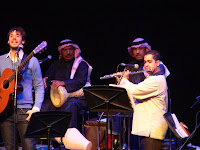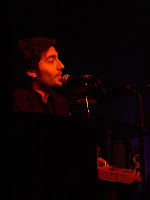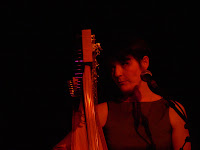Scotland and England, in Northern Europe, and Bahrain, on the Arabian Peninsula, would not at first seem to have a great deal in common. One thing connects them, though: the peoples of all three countries have close connections to living by and working on the sea. That is the idea which the British Council and the Celtic Connections Festival had in mind when they brought five musicians from Bahrain, three from England, and three from Scotland together for five days in Glasgow with the commission to collaborate to create a program of music focused on the seafaring traditions of both countries, and their traditional musics which have grown up around this.
A full on evening from Shifting Sands, as the project is known, took place in the Strathclyde Suite of the Glasgow Royal Concert Hall. That’s a room which lends itself to a less formal atmosphere than the main hall, an atmosphere which the musicians took advantage of in explaining their work and occasionally joking about learning each others’ traditions. languages, and songs.
 They engaged the audience immediately by opening with the sea chanty Bulley in the Alley, the strong and familiar a capella work rhythms of the song given unusual color by accompanying rhythms from Bahrain. A Northumbrian seafaring song joined with a Scottish strathspey and a Bahraini sawt followed. Through the evening, two musicians from Bahrain played percussion instruments from their homeland. Hassan Hajari played the oud, a bouzouki like instrument, while Mohammed Aseeri played the qanun, a instrument a bit like a zither or a plucked dulcimer. Ahmed Al Ghanem played the flute. On the English side of things, Andy Mellon, musical director of the project, was at the piano and played trumpet, while Pete Flood was at the drum kit and Sam Carter played guitar, sang lead, and did a good bit of the commentary. Corrina Hewat sang lead and played harp and handled commentary as well,keeping thing lively and informal as is her style. Inge Thomson played accordion, and Matheu Watson was on fiddle.
They engaged the audience immediately by opening with the sea chanty Bulley in the Alley, the strong and familiar a capella work rhythms of the song given unusual color by accompanying rhythms from Bahrain. A Northumbrian seafaring song joined with a Scottish strathspey and a Bahraini sawt followed. Through the evening, two musicians from Bahrain played percussion instruments from their homeland. Hassan Hajari played the oud, a bouzouki like instrument, while Mohammed Aseeri played the qanun, a instrument a bit like a zither or a plucked dulcimer. Ahmed Al Ghanem played the flute. On the English side of things, Andy Mellon, musical director of the project, was at the piano and played trumpet, while Pete Flood was at the drum kit and Sam Carter played guitar, sang lead, and did a good bit of the commentary. Corrina Hewat sang lead and played harp and handled commentary as well,keeping thing lively and informal as is her style. Inge Thomson played accordion, and Matheu Watson was on fiddle.
A song from Egypt and several from Bahrain ensued, as did a traditional song that’s found in many forms across the British Isles. telling the story of a woman who is happy her love has gone to sea and is able to better himself from his former work as a shoemaker.
 All through these songs and tunes, each of the musicians was involved and engaged and contributing to the music: Among them, they come up with a sound both different and familiar, a fusion of music that really worked and which, clearly, they were happy to be sharing with the audience. The audience members liked it too. There was a feeling of interest and acceptance through the nearly packed out house, and a lively buzz of conversation at the break before the second set.
All through these songs and tunes, each of the musicians was involved and engaged and contributing to the music: Among them, they come up with a sound both different and familiar, a fusion of music that really worked and which, clearly, they were happy to be sharing with the audience. The audience members liked it too. There was a feeling of interest and acceptance through the nearly packed out house, and a lively buzz of conversation at the break before the second set.
It was a set that delivered on the promise of the first half of the evening. With musicians and audience increasingly relaxed and engaged with each other as the night went on, all on stage got involved in the funny and silly rhythms of the the song The Herring’s Heed, and the quieter but still lively Bahraini piece Simsima, named after one of the ships common in the Persian Gulf around Bahrain, and the Shetland tunes The Full Rigged Ship and the New Rigged Ship. Shetland native Thomson clearly was deep into the music while leading the ensemble of musicians on tunes from her native islands. The stunner of the whole evening, though, was another Scottish song, The Mingulay Boat Song, from the Outer Hebrides, in which the singing was underscored by traditional vocal chant from Bahrain which is sung by pearl divers there. Both with voices and through instruments, it was piece that brought the presence and place of those who sail the sea waters, and the longing and loneliness and passion that goes along with that, powerfully into the heart of the concert.
traditional vocal chant from Bahrain which is sung by pearl divers there. Both with voices and through instruments, it was piece that brought the presence and place of those who sail the sea waters, and the longing and loneliness and passion that goes along with that, powerfully into the heart of the concert.
At as the music drew to its close with another lively sea chanty, the musicians were clearly moved and delighted as audience members stood to give then a prolonged round of clapping and calling for more. Coming back on stage, they reprised one of the songs they’d played earlier (‘we really didn’t think we’d get an encore,” Mellon said) as musicians and audience both came to the end of an adventurous and memorable evening.
Photographs made with permission of artists, and are copyrighted. thank you for respecting this.
This concert took place, and I wrote this piece, before the current political events emerged in Bahrain. I considered rescheduling it, but on reflection it seemed to me that perhaps a different sort of news on the country also has its place just now, as does consideration of the connecting and healing power of the arts.
Consider subscribing to our stories through e mail, and connecting with us through your favorite social networks. You will find links to do that in the sidebar — and while you’re at that social network exploring, we invite you to keep up with our adventures by liking the Perceptive Travel Facebook page.
